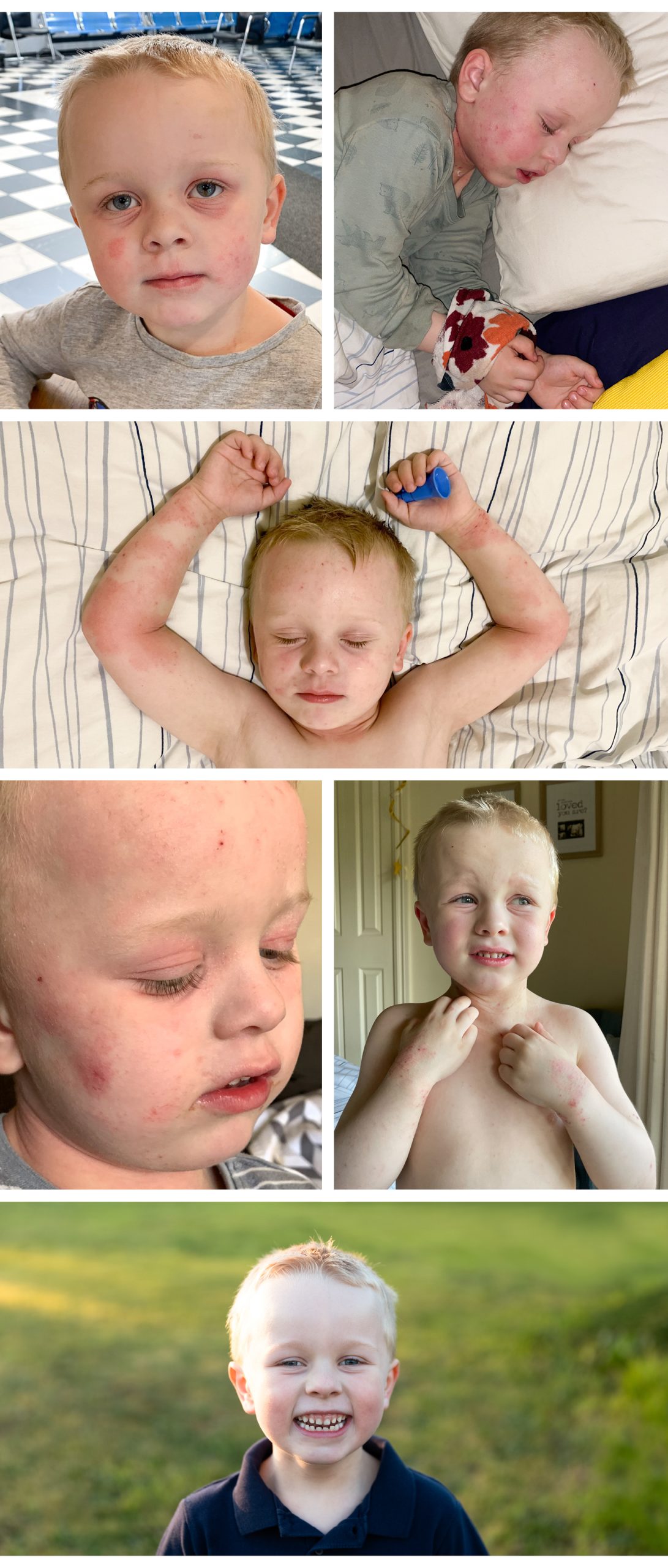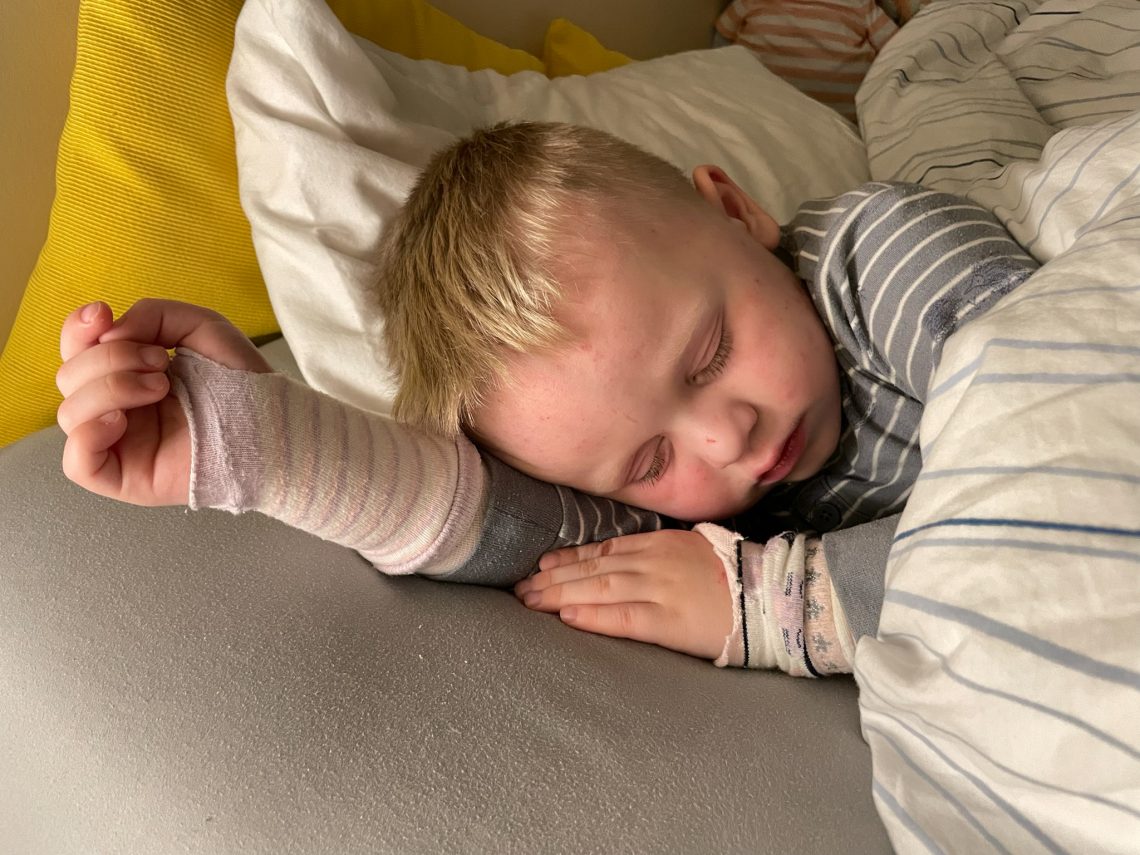Image above: Levi with his homemade wrist socks to stop him scratching his skin while he was sleeping.
Marnie Hibbert, a Mum from Melbourne has experienced first hand the extensive impact eczema can have on day to day life. Her son, Levi, was diagnosed with severe eczema and it was a challenging time. She wanted a way to help her son and his friends understand what was going on, so she wrote a book. She loves being able to make a difference by sharing her knowledge in the hope of helping others. She a graphic designer, photographer and children’s book author and she’s here to tell us about it.
What age was your son diagnosed with eczema?
At 4 years old he was diagnosed with moderate to severe eczema and by the time he was 5.5 years we ended up at the Royal Childrens Hospital not knowing what else to do.
How did eczema affect him?
Levi was severely affected by his eczema, he couldn’t sit still as he was so used to itching and fidgeting, he wasn’t able to ride his bike as he needed to keep stopping to scratch his skin, showering or bathing would sting his skin and most creams, despite stating they were ‘sting free’ would make him cry out in pain. Sleeping was difficult. He was so itchy, that he couldn’t settle to go to sleep, then once he was asleep he’d scratch and rip his skin making it bleed. I handmade wrist covers out of socks that I dampened with water to cool and cover his wrists at night. During the day he’d be tired and not want to do even his favourite activities. At preschool, kids wouldn’t want to sit near him as they thought they would catch his rash, and parents moved their children away from Levi as they didn’t know what it was. Every day he needed to wear long sleeve tops, even in summer, to protect his skin and to reduce the amount of children pointing at him. It was not an easy time. I would be woken throughout the night hearing him whimpering in his sleep, only to find he’d torn his skin. I’d get wet face washers and rotate them through the night so his skin stayed cool and therefore reduced the itch.
What helped Levi?
Cool salt baths, wet wrapping, applying a lot of creams, finding out what he was allergic too then eliminating those. After meeting a paediatric nurse practitioner who prescribed different medication and a specific skin regime, his skin was healed in under 2 weeks.
Your book ‘The Eczema Detective’ was launched this September. What is it all about?
The Eczema Detective is about a little boy who tells his buddy, Squirrel, how eczema makes him feel and asks for help. So they pretend to be detectives to uncover what is triggering his eczema. Squirrel teaches him a simple tool which helps him to feel better. There are also facts, tips, preschool activities, and The Eczema Tool to guide parents in creating a positive experience when managing it all. It’s honest, simple, fun, and a book that I wish I had when my son was little.
Why is your book different?
Most books I found for eczema were about managing eczema, rather than explaining what eczema is to young children and how they can feel when suffering with it. At such a young age they don’t know why they have eczema and become irritable due to the relentless nature of the itchiness. It’s a time in their life where they are exploring messy play, running round and are supposed to experience a playful carefree life, but when you have a chronic condition, it makes it very hard to enjoy. So to reframe the irritating nature of eczema, and acknowledge their worries I created a fun story to explain it.
Why did you write a book?
After what we went through, I wanted children to know that there are solutions to problems. By learning how you can be in control of eczema, rather than being controlled by it is very empowering. This feeling sets a child up believing they can change adversity. Creating a book is an easy and simple way that I could explain a big concept to help children anywhere in the world.
Is there a time you remember from these days that you’ll never forget?
There are a few, but one that makes me melt and energised at the same time was that one day he was crying and yelling at me to stop putting his moisturisers on and I said ‘I wish I could take away your eczema so you’re not hurting anymore’ and he stopped yelling and said, ‘But Mum, you already are’. In his mind, despite the stinging and pain, he knew I was trying to make it better for him.
I see the Eczema Association of Australasia have supported you in creating this resource for families. Tell us about that.
Yes, they have been my biggest cheerleaders in producing this book. Like me, they needed a way to explain eczema to children and their parents in a gentle, accurate and fun way. Without their knowledge and experience I wouldn’t have been able to publish a book on a medical topic so I’m very grateful.
Where can people go if they need help with eczema?
Start with your GP and connect with the Eczema Association for support and tips. They have a wealth of knowledge and are there to help.
Where can families buy your book?
Online at www.butterflypublishing.com.au or ‘The Eczema Detective’ on Amazon.
Below you’ll see the extent of Levi’s eczema from when he was 4 to 6 years old. The last photo is when his skin was all clear and he could sleep through the night without being itchy.


